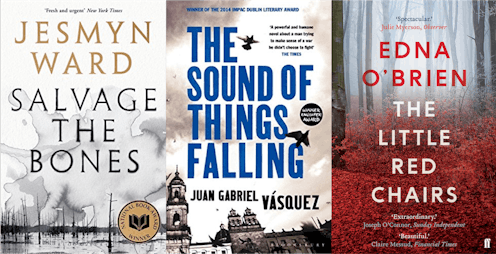Books
5 Books Inspired By Real Events That Prove Fact Makes Incredible Fiction

It takes an unusually dexterous author to write a successful novel based on true events. The writer must juggle history with invention, without allowing one to compromise the other; the novel shouldn't read like a textbook, but shouldn't too grossly distort its historical inspiration for entertainment. But the authors who succeed often create some of the most compelling, profoundly insightful books to ever line your bookshelves — and if said shelves are looking a little empty? That's where I come in. Try one of these five books inspired by real events, and reach the last page with a closer sense of what it is to be human.
Though historical fiction is a richly populated genre, the selections on this list all deal with the 20th and 21st centuries, from the United States to Ireland. National Book Award winner Jesmyn Ward takes inspiration from her own experience of Hurricane Katrina in Salvage the Bones, while Toni Cade Bambara depicts another American tragedy — the Atlanta child murders — in These Bones Are Not My Child. In The Little Red Chairs, Edna O'Brien transports a Bosnian Serb war criminal to rural Ireland, while Juan Gabriel Vásquez takes on the Colombian drug trade in The Sound of Things Falling. And in Alejandro Zambra's Ways of Going Home, the author tackles childhood and nostalgia against the backdrop of the Pinochet regime in Chile. Intrigued? Just read on.
'Salvage the Bones' by Jesmyn Ward
Esch's family live in a Mississippi town soon to be ravaged by Hurricane Katrina, preparing for the oncoming storm as they grieve Esch and her siblings' recently lost mother. Esch is pregnant, and has yet to tell the father, Manny, with whom she's enchanted; she fixates on Medea, the tragic antihero of Greek mythology, as she makes sense of love and motherhood and heartbreak. Ward lived through Hurricane Katrina herself, and the terror and desperation of its victims vibrate through the final pages as the hurricane hits.
'The Sound of Things Falling' by Juan Gabriel Vásquez
It's a tenuous friendship that thrusts university lecturer Antonio Yammara back into the history of the Colombian drug trade. He befriends Ricardo Laverde, an elusive older man, in a pool hall in Bogotá; on a street corner outside, Laverde is shot dead, while Yammara is grievously wounded. Grappling with the psychological aftermath of his injury and transfixed by the mysteries of Laverde's life, Yammara plunges into the origins, the horror, and the lasting trauma of the cartels' reign.
'The Little Red Chairs' by Edna O'Brien
O'Brien's novel takes significant inspiration from the "butcher of Bosnia," Serbian politician Radovan Karadžić, in creating the secretive Doctor Vlad. Arriving in a remote Irish village, Vlad presents himself as a sex therapist, to the suspicion and hostility of the residents. Fidelma, a lonely local woman, is entranced by him — but the brutal crimes of "Vlad's" past cannot long be contained.
'Ways of Going Home' by Alejandro Zambra
Zambra's novel blends two narratives: a frame, that of an author writing a novel, and said author's novel. In the latter, the novelist's central character is a child during the dictatorship of Augusto Pinochet in Chile, little understanding the political context of his existence. It's only as an adult, the nameless protagonist discovers, that the fragments of his childhood slot into place.
'These Bones Are Not My Child' by Toni Cade Bambara
Between 1979 and 1981, almost 30 African American children were murdered in Atlanta, Georgia; though the murders were attributed to local man Wayne Williams, many believe he was wrongfully accused. It's amidst this horror that Toni Cade Bambara set These Bones Are Not My Child, edited for publication after her death by Toni Morrison. Zala Spencer's oldest son, Sonny, has gone missing, and Spencer immerses herself in the panic in the desperate hope of finding her son alive.